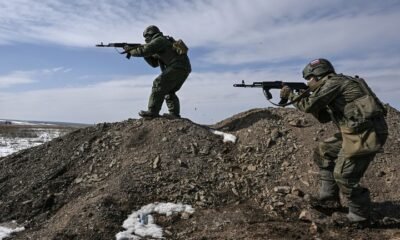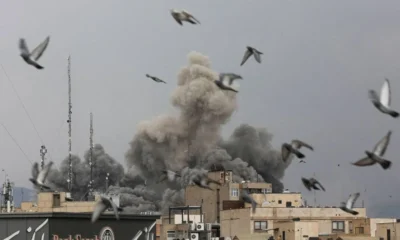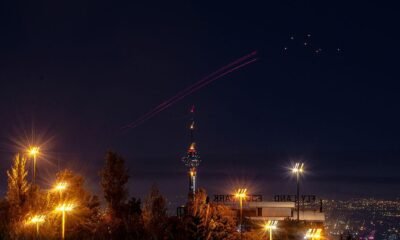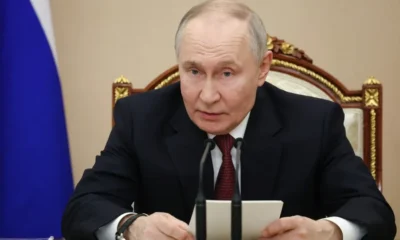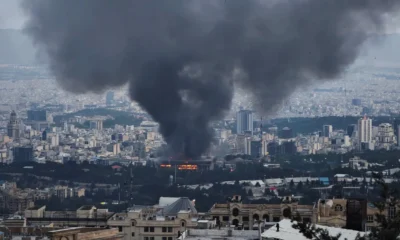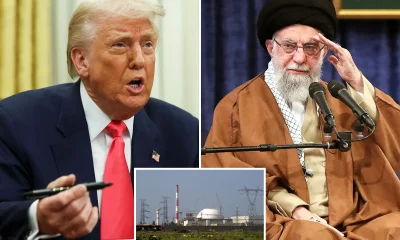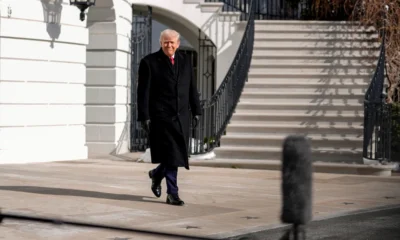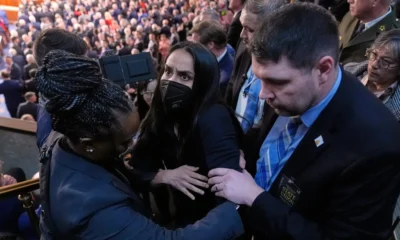Top stories
Somalia is Dangerous: Former US Deportees Struggle With Fear, Uncertainty

Those previously deported by the US warn that President Trump’s plan to expel more Somali migrants may endanger lives.

Mukhtar Abdiwhab Ahmed, who lived in the US as a refugee, was deported back to Somalia in 2018
Mukhtar Abdiwhab Ahmed sits in a plastic chair outside his house in Mogadishu. Nearby, children play, soldiers congregate, and rickshaws speed by under the scorching sun.
“If I knew I would end up here [in Somalia] I would have never gotten these tattoos,” the 39-year-old tells Al Jazeera, saying he has taken to mostly wearing long sleeves to avoid the negative comments and “dirty looks” he gets from people in the city.
Mukhtar spent most of his life in the United States but has struggled to readapt to conservative Somali society since being deported in 2018 under the first Donald Trump presidency.
Now, newly inaugurated for a second time in office, the Trump administration has once again announced removal orders for migrants he says are in the US “illegally”. This includes more than 4,000 Somalis who, like Mukhtar, face deportation to the country of their birth.
But lawyers, activists and Somalis who were deported from the US in previous years say the plan may put lives at risk as insecurity and instability still plague Somalia, readapting to a country many left as children is difficult, and work opportunities are scarce.
Meanwhile, Washington itself warns its own citizens about “crime, terrorism, civil unrest … kidnapping, [and] piracy” in the East African country, where attacks by the armed group al-Shabab are a common occurrence.
‘The wrong path’
Mukhtar and his family were among the first to flee Somalia after the collapse of the government in 1991. They left for neighbouring Kenya before Mukhtar and his older brother made it to the US as refugees.
The two settled in the south end of Seattle, Washington in 1995 – an area with high rates of poverty and youth violence, where Mukhtar says he fell into “crime, drugs and temptation”.
“At 16, I started getting into trouble,” he says. He skipped school, dabbled in crime, and was arrested and charged with a felony after stealing and crashing a relative’s car.
Though he tried to get his life on track, in 2005, he was charged with armed robbery. It was the then 19-year-old’s first time going through the system as an adult; he was found guilty and sentenced to two years in prison.

Mukhtar was deported from the US after he was arrested and jailed for a crime
The day his sentence ended, agents from US Immigration and Customs Enforcement (ICE) visited him in prison, and instead of releasing him, transferred Mukhtar to the Northwest Detention Center in Tacoma, Washington – one of the largest immigration detention centres in the US.
“It felt like serving two sentences for committing one crime, and when I reached the immigration jail, I felt like an animal being taken to the slaughterhouse,” he says.
A few months in, ICE agents brought him a document to sign, saying he would be deported to Somalia. As part of its Criminal Alien Program, ICE works to identify and remove jailed migrants they believe “threaten the safety” of the US.
Mukhtar says he knew he wouldn’t be deported as Somalia was at war. It was 2007 and during that time, US-backed Ethiopian troops were in the country battling splinter groups that rose from the ashes following the ouster of the Islamic Courts Union, and the subsequent rise of its youth military wing, al-Shabab.
Tired of being in prison, Mukhtar decided to sign the document. But after he was released by ICE, he says he “kept going down the wrong path”. When he was arrested for burglary in 2015, he expected to be released after completing his one-year sentence, but ICE showed up again and sent him back to Northwest Detention Center for 11 months.
“It was like history repeating itself once again,” he says.
He again thought ICE would not deport him to Somalia “because of the war and instability back home”. But in December 2017, he was among 92 Somalis put on a deportation flight manned by ICE agents that prompted an international outcry after the plane did not make it to its destination for logistical reasons and it emerged that the deportees were abused en route.
“We were abused on the deportation flight,” he says. “I recall there were about 20 guards, they roughed up a lot of us, including one guy who was tased. They really beat us and, mind you, the whole time we were in handcuffs and shackled by our waist and feet for like 40 hours.”
Upon returning to the US, they were taken to an immigration detention centre and most of the Somalis on his flight filed motions to reopen their immigration cases to fight deportation.
However, others like Mukhtar accepted deportation to Somalia – rather than risk a lengthy court process and further jail time.
“If I look at all the times I’ve been incarcerated my entire life, it adds up to eight years, nearly a decade, and I couldn’t bear to stay behind bars any longer,” he says.

Mukhtar, left, and fellow deportee from the US, Anwar Mohamed, try to readjust to life in Mogadishu
‘Too dangerous for ICE agents’
In March 2018, Mukhtar was one of 120 migrants on a deportation flight from the US – 40 Somalis, 40 Kenyans and 40 Sudanese, he says. The Kenyans were released upon the plane’s arrival in Nairobi, while the Sudanese and Somalis were placed on separate flights headed for Khartoum and Mogadishu, respectively.
“We were still handcuffed when we switched planes in Nairobi but the ICE agents didn’t continue the journey with us from Nairobi to Mogadishu,” Mukhtar says.
Other deportees sent back in past years also report ICE using a third party to complete the removal process to Somalia.
In 2005, Somali immigrant Keyse Jama was flown from Minneapolis to Nairobi by ICE, only for a private security firm to escort him to Somalia – at a time when most of the country was controlled by strongmen.
Anwar Mohamed, 36, who was deported a month after Mukhtar, says he landed in Nairobi before he and the other Somali passengers were placed on another flight to Mogadishu.
“When we asked the ICE agents why they weren’t going to escort us to Mogadishu, they responded by saying Somalia is too dangerous,” Anwar tells Al Jazeera.
“If Somalia is too dangerous for ICE agents to go, then why did the [US] government send us here?” he asks.
As of 2024, the US State Department has marked Somalia as a level 4 “Do Not Travel” country for US citizens, citing crime, terrorism and kidnapping, among other reasons. Al-Shabab and other groups opposed to the government continue to carry out armed attacks, including in places frequented by civilians.
While Somalia is deemed unsafe for US citizens, the Trump administration has marked 4,090 Somalis for deportation this year.

Residents gather near the scene of an explosion of a bomb-rigged car parked near the National Theatre in the Hamar Weyne district of Mogadishu in September 2024 [Feisal Omar/Reuters]
“The Trump administration is definitely endangering lives by deporting people to places like Somalia,” says Marc Prokosch, a senior lawyer at Prokosch Law, a firm in Minnesota that specialises in immigration cases.
“The balancing test for elected officials is whether it is worth it when considering our legal obligations [such the Convention Against Torture] and our moral and ethical obligations, compared to the obligations of protecting the safety and security of United States citizens,” he tells Al Jazeera, referring to the argument that migrants accused of violent offences should be deported for the safety of Americans.
Other immigration lawyers representing Somalis in the US have also voiced concerns, saying many of their clients are “terrified”, including exiled Somali journalists. One lawyer in Minnesota said in December that dozens of Somali asylum seekers have fled into neighbouring Canada over fears of an ICE clampdown.
Meanwhile, Human Rights Watch has cautioned that Temporary Protected Status – which protects foreign nationals from “unsafe” countries from deportation – may not be renewed for Somalis under the new Trump administration.
‘I saw the lifeless bodies of my friends’
Like Mukhtar, Anwar also fled Somalia during the civil war in the 1990s. His childhood memories of the country are bleak, he tells Al Jazeera, recounting one day that stands out in his mind.
“I was playing outside [in Mogadishu] with a couple friends, then we found an oval-shaped object on the ground. That’s when my mother called me in for Asr [afternoon Muslim] prayer,” Anwar recounts. “And then I heard a large explosion.
“Everyone from our neighbourhood came rushing outside, including me. I then saw the lifeless bodies of my three friends strewn on the dirt road … They died from the oval object they were playing with.
“Years later, when I matured, then did I only realise it was a grenade we were playing with and my mother’s call to prayer is what saved me,” he says.
Not long after that day, Anwar’s older brother was murdered by armed fighters. That was the last straw for his family, he says. His mother sent him to Kenya in 1997, before he and his older sister moved to the US as refugees.
But in the US, Anwar got involved in crime and violence, ultimately being jailed for 10 years for robbery in a state prison in Missouri.
Soon after he was released, he once again found himself in handcuffs – this time on a deportation flight to Somalia in April 2018.

Anwar fled Somalia for the US as a child, but was deported back there in 2018
Returning to Mogadishu after decades, he found himself in unfamiliar terrain.
“When I had the chains removed after arriving [in Mogadishu] is when it hit me: I was free but I really wasn’t free,” Anwar says, feeling like he was still imprisoned by his traumatic childhood memories.
Anwar started having flashbacks of past experiences in Somalia. To make matters worse, Mogadishu was still in a protracted state of conflict, and he felt death was a daily reality.
When he made his way to his father’s house to reconnect with relatives he hadn’t seen in more than 20 years, he saw his siblings shaking hands and laughing with armed soldiers sitting on top of a pick-up truck mounted with an anti-aircraft gun.
“As a child [in Somalia] during the civil war, these kinds of people [armed men] were feared,” he says, “but now many of them wear uniforms, have allegiances to the state and are tasked with security.
“The same thing [guns] my mother was shielding me from when she sent me away to the refugee camps in Kenya as a child have become a part of everyday life.”
‘Every road I take can lead to death’
In March 2018, when Mukhtar’s plane landed in Mogadishu, he also found a society he couldn’t understand and a language he knew little of.
“It felt like starting life from scratch all over again,” he says.
Many Somali deportees from the US don’t have family members to return to because they’ve either been killed in the continuing three-decade-long conflict or fled the country and never returned, Mukhtar says.
“When you don’t have no one to come home to or a place to go, it leaves many deportees vulnerable and might force some to resort to crime as a means of survival.”

“With every step you think you’re going to die,” Mukhtar says
Upon returning to the city, Mukhtar saw tall apartment buildings, condominiums and paved roads in Mogadishu. It was different from the bullet-riddled buildings and bombed-out infrastructure he saw on television, he thought. But the realities of the war were around him in other ways, as he would soon find out.
“In Mogadishu, explosions are reality and can happen any moment … You can be walking down the street and an explosion can take your life. In this city, there aren’t warnings before bombings, only screams and cries that come after,” he says.
At first, Mukhtar settled in an old family home in the Waberi district – an upscale area home to government employees, security officials, diaspora returnees and locals working for international NGOs. But even areas that are deemed safe are not, he says.
One sweltering day, Mukhtar looked out of his window as a group of men played dominos, labourers trekked through a construction site, and young women sold tea outside.
“I was thinking of walking down the street to get cigarettes but I felt kind of lazy and decided to stay home,” Mukhtar says, “[then] I heard a very loud explosion.”
He later learned that the blast took place on the same road he always walked down.
“I could have died if I didn’t choose to stay home that day. I was lucky but you never know when you’ll meet the same fate as those caught up in that explosion,” he says.
“Every road I take can lead to death, and with every step, you think you’re going to die.”
‘No opportunities’
Added to the precarious security situation in Somalia is a lack of opportunities, deportees say.
Youth make up an estimated 70 percent of Somalia’s population, yet the country has a nearly 40 percent youth unemployment rate.
“There are no opportunities here and we don’t have a stable country,” says Mukhtar, who is unemployed. “If you’re a deportee, it’s much worse.”

Several deportees from the US now living in Mogadishu have joined the police or army
Some deportees who speak both English and Somali have found work as interpreters, but most do not as they have lost their mother tongue in the years abroad.
Meanwhile, several have joined the police force or national army upon returning to Somalia.
“Many of these guys being deported from the US are coming to Somalia after serving 10 or 15-year prison terms,” Mukhtar says.
When they join the police or army, “they get $200 a month as a salary”.
Mukhtar has, at times, contemplated joining the police or the army, but decided against it.
“When you’re wearing a uniform and carrying a gun, you don’t know who or when someone is going to take your life,” he says.
Aside from threats to their physical safety, the cultural chasm between deportees and their countrymen also weighs on them.
Mukhtar says stigma from members of the community is something he still faces, despite having been back for several years.
“The tattoos I got at a young age also came back to haunt me,” he adds, saying that tattooing is viewed as alien or taboo by many in the deeply conservative Somali Muslim society, and that he’s even been verbally abused at a mosque when he pulled up his sleeves to perform ablution before prayers.
‘The card I’ve been dealt’
Anwar has also faced stigma.

Anwar now drives a rickshaw to make a living in Mogadishu
“When I first came here, I stuck out,” he says, also mentioning his tattoos, which he has started to cover up.
“Everything from the way I walked to the way I spoke Somali. Everyone knew I wasn’t a local and when they found out I was deported from the US, they looked at me as if I was the guy who dropped the ball at the finish line.”
Being away in the US and far from Somali customs, culture and language all contributed to difficulties readjusting to life in Somalia.
“I didn’t adapt to this environment by choice. It was forced upon me, the day I arrived in chains,” he says.
He has even found himself stopped by intelligence officials and cross-questioned about where he’s from and what he’s doing here, he says.
“I asked myself how long is this going to go on,” he laments.
Still, he is determined to adjust to his new life.
“I changed my ways, got married and [now] drive a rickshaw to get by. I try my best, but the hostility from some members of my community … makes living in an already hostile environment even more hostile,” he says.
“But I don’t blame them for their ignorance,” Anwar adds. “This is the card I’ve been dealt and I have to make the best of it.”
Middle East
Oil Surges, Gas Soars as Gulf War Threatens Global Energy Arteries
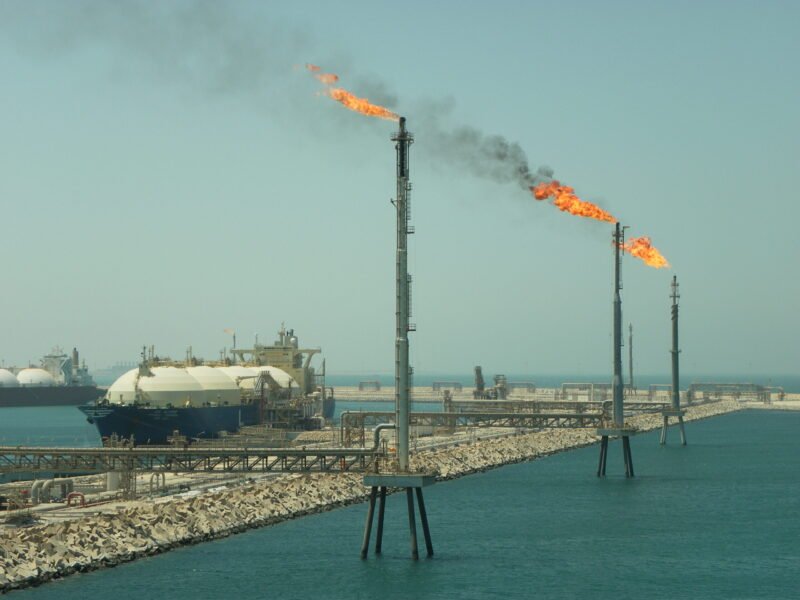
Strait of Hormuz Tensions and LNG Shutdown in Qatar Send Shockwaves Through Markets.
Missiles in the Gulf. Tankers at anchor. Is the world on the brink of an energy shock?
Energy markets jolted sharply higher as the widening conflict between Iran, the United States and Israel began to threaten critical oil and gas infrastructure across the Gulf.
Global benchmark Brent crude briefly climbed to $82 a barrel on Monday after reports that at least three vessels were attacked near the Strait of Hormuz — the narrow waterway through which roughly 20 percent of the world’s oil and gas flows. Iran warned ships against transiting the strait, deepening fears of a supply choke point.
Natural gas markets reacted even more dramatically. Europe’s benchmark gas price surged as much as 50 percent before closing 39 percent higher after QatarEnergy halted liquefied natural gas production following drone strikes on facilities in Ras Laffan Industrial City. Qatar’s defense ministry said the damage was contained, but the suspension rattled traders.
In neighboring Saudi Arabia, Saudi Aramco temporarily shut its Ras Tanura refinery after a drone strike, further tightening concerns about regional output.
Shipping disruptions compounded the volatility. The UK Maritime Trade Operations reported multiple security incidents in the Arabian Gulf and Gulf of Oman. At least 150 tankers dropped anchor outside the Strait of Hormuz, while major operators rerouted vessels to avoid exposure. Danish shipping giant Maersk paused sailings through the Bab el-Mandeb Strait and Suez Canal, diverting around Africa’s Cape of Good Hope.
Equity markets reflected the uncertainty. London’s FTSE 100 fell 1.2 percent, led lower by airlines and banks exposed to energy-sensitive sectors. France’s CAC-40 and Germany’s DAX posted steeper declines. In the United States, the S&P 500 and Nasdaq initially fell but later recovered to close modestly higher.
Analysts cautioned that markets are not yet in crisis mode. “The market isn’t panicking,” said Saul Kavonic of MST Marquee, noting that major oil infrastructure has not been comprehensively disabled. Others warned, however, that a prolonged conflict could push crude above $100 a barrel, feeding global inflation.
Economists say sustained energy price spikes would quickly filter into food, industrial commodities and transport costs. Central banks, including the Bank of England, could be forced to delay planned interest-rate cuts if inflation pressures intensify.
For now, the Strait of Hormuz remains the focal point. As long as tankers hesitate and production remains uncertain, volatility is likely to persist — a reminder that even limited regional conflict can ripple across the global economy within hours.
Middle East
Trump Rebukes Britain as Iran War Strains ‘Special Relationship’
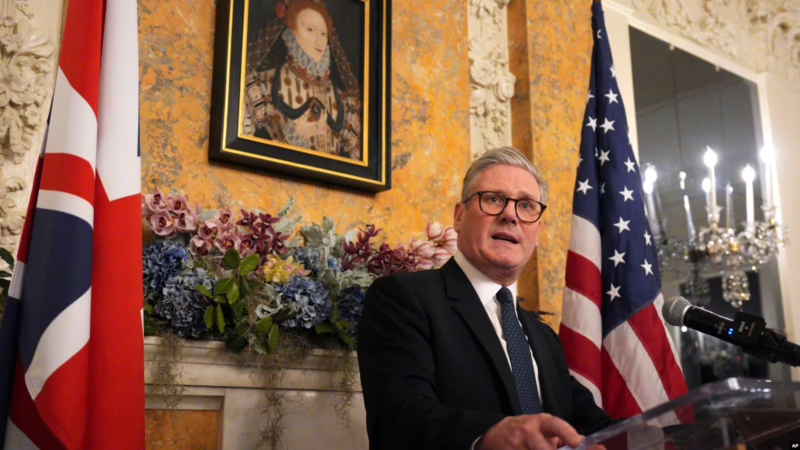
US President Says Historic Alliance Has Changed After UK Hesitation Over Iran Strikes.
From “special relationship” to public frustration — is the Atlantic alliance cracking?
U.S. President Donald Trump said the once “most solid relationship” between Washington and London is “not like it used to be,” signaling a rare public strain in the transatlantic alliance as the Middle East conflict widens.
In an interview with The Sun, Trump criticized British Prime Minister Keir Starmer for initially refusing to allow the United States to use British military bases in operations connected to strikes on Iran.
“This was the most solid relationship of all,” Trump said. “Now we have very strong relationships with other countries in Europe,” singling out France and Germany.
He described Starmer as “not helpful” and said he never expected such hesitation from the United Kingdom. Though he later acknowledged Britain’s decision to permit limited use of bases for what London described as a specific defensive purpose, Trump argued that the approval “took far too much time.”
The disagreement touches on politically sensitive terrain in Britain. Memories of former Prime Minister Tony Blair’s support for the 2003 Iraq invasion continue to shape public and parliamentary caution over Middle East interventions.
Addressing Parliament, Starmer defended his position, saying his duty was to act in Britain’s national interest. “We all remember the mistakes of Iraq,” he said, stressing that any UK involvement must have a lawful basis and a clear strategic plan.
Downing Street confirmed that British bases, including RAF Akrotiri in Cyprus, were not being used by U.S. bombers for offensive operations. The Cypriot base was itself struck by an unmanned drone, which Starmer said had been launched prior to Britain’s policy decision.
The exchange marks one of the sharpest rhetorical breaks in U.S.-UK relations in years. While the alliance remains operationally intact — particularly within NATO — the public tone reflects deeper unease over strategy, escalation and political risk.
For Washington, speed and alignment are strategic necessities in a fast-moving conflict. For London, caution carries domestic and legal weight. The friction underscores a broader reality: even long-standing alliances can bend under the pressure of war.
Top stories
War Expands Across Region as Iranian Militias Join Fight
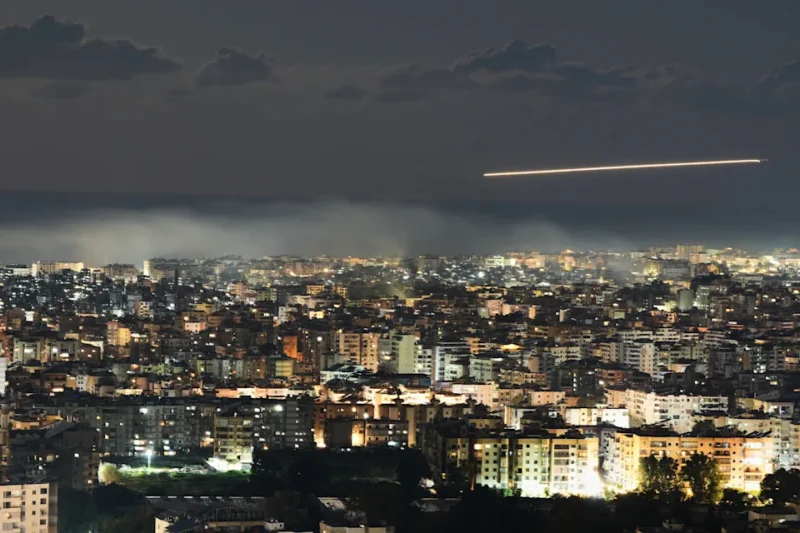
Embassies struck. Oil refineries targeted. Militias entering the war. The conflict is no longer confined to two countries.
The war between Israel, the United States and Iran widened sharply Monday as Iranian-backed militias joined the confrontation, missiles struck diplomatic and energy targets, and casualties mounted across multiple countries.
Iran and allied groups launched attacks on Israel and several Gulf states hosting American forces. In Kuwait City, fire and smoke were seen rising from inside the U.S. Embassy compound after reported missile or drone impacts. Kuwait’s defense ministry said several American warplanes crashed in the country, though it did not specify the cause. The U.S. military has not publicly confirmed those details.
Iranian officials said at least 555 people have been killed nationwide since the U.S.–Israeli air campaign began, with more than 130 cities reportedly struck. Israeli authorities said 11 people have been killed there in missile attacks.
In Iraq, a pro-Iranian militia claimed responsibility for drone strikes targeting U.S. forces at Baghdad’s airport and previously at Irbil. In Lebanon, Hezbollah said it fired missiles into Israel, prompting extensive Israeli retaliatory strikes that Lebanese authorities say killed at least 31 people.
Energy infrastructure has now entered the battlefield. Saudi Arabia’s Ras Tanura refinery — one of the world’s largest — was targeted by drones, which Saudi defenses said were intercepted. Kuwait and the United Arab Emirates also reported debris and damage linked to aerial interceptions.
Analysts say the strategy appears designed to impose economic pressure. “Gulf energy infrastructure is now squarely in Iran’s sights,” said Torbjorn Soltvedt of Verisk Maplecroft, warning of prolonged uncertainty for global oil markets. Roughly one-fifth of global oil trade passes through the Strait of Hormuz, where maritime tensions are rising.
Meanwhile, Iran’s envoy to the International Atomic Energy Agency accused Washington and Tel Aviv of striking safeguarded nuclear facilities, including Natanz. The United States and Israel have not publicly confirmed those claims.
President Donald Trump said U.S. combat operations would continue “until all objectives are achieved,” adding that further retaliation would be met with force. Britain, France and Germany signaled support for efforts to halt Iranian attacks but urged de-escalation.
The World Health Organization called for the protection of civilians and medical facilities as fighting spreads. With regional militias now active and oil infrastructure under threat, the conflict has entered a broader and more volatile phase — one that risks drawing in additional states and further destabilizing global markets.
Top stories
UK’s Youngest Somali Pilot Takes Off

At 16, he flew solo. At 18, he’s chasing the captain’s seat. Meet the young pilot changing representation in British aviation.
At 18 years old, Suleiman Dida has already crossed one of aviation’s most defining thresholds: flying solo. Born in northwest London to parents from Mogadishu, Dida is now recognized as the United Kingdom’s youngest Somali pilot — a milestone in a field where Somali representation has historically been rare.
His fascination with flight began in childhood, watching uniformed pilots stride through terminals during family trips. That early curiosity turned into disciplined preparation. From his bedroom, he built a home flight simulator and logged hours on VATSIM, an online network that mirrors real-world air traffic control communications. It allowed him to practice navigation, phraseology and cockpit procedures long before stepping into a real aircraft.
He began formal flight training at 14. By 16, he completed his first solo flight in a Piper PA-28-140 — a moment widely regarded as one of the most demanding psychological tests for any pilot in training. Taking off, flying circuits and landing without an instructor onboard requires complete control and confidence.
Now working toward his Private Pilot Licence (PPL), Dida continues building hours in single-engine aircraft while preparing for the rigorous academic demands ahead. In the UK, aspiring commercial pilots must pass 14 Airline Transport Pilot Licence (ATPL) theoretical exams covering subjects from meteorology to aerodynamics — a hurdle many describe as among the toughest in aviation.
The path is also expensive. Training can exceed £100,000. Rather than enroll in a full-time academy program, Dida chose the modular route, completing qualifications in stages while managing costs. He began saving toward training expenses while still in primary school.
He has secured a conditional offer with Ryanair to fly the Boeing 737-800 once he completes required certifications and flight hours — a potential first step into commercial aviation.
Long term, his ambitions stretch further. He hopes to command wide-body aircraft like the Boeing 777 for global carriers such as Qatar Airways, Emirates or Ethiopian Airlines. And if Somalia’s national airline returns, he says he would welcome the chance to fly for his country of heritage.
“I didn’t see Somali pilots out there,” he said. “So I wanted to change that.”
Dida’s journey remains in its early stages — still grounded in classrooms and light aircraft rather than airline cockpits. But for many watching, his progress signals a shift: a new generation stepping into industries once seen as out of reach.
“See you in the skies,” he says — and he means it.
Top stories
Dubai, Doha and Abu Dhabi Close Airports
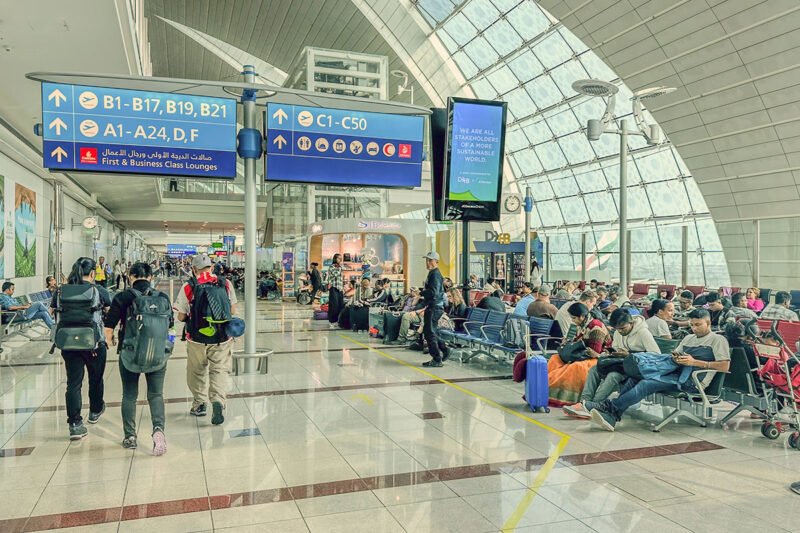
Flights grounded. Airports shut. Hundreds of thousands stranded. The Middle East conflict is now hitting global travel hard.
Air travel across the Middle East plunged into chaos Saturday after US and Israeli strikes on Iran — and Iran’s retaliatory missile attacks — forced major regional hubs to shut down, triggering one of the worst aviation disruptions in years.
Dubai International Airport, the world’s busiest international travel hub handling more than 1,000 flights daily, suspended operations after sustaining damage during overnight missile attacks. Airports in Abu Dhabi and Kuwait were also affected, while Doha’s Hamad International Airport closed as airspace across large parts of the region was shut.
Flight-tracking maps showed skies over Iran, Iraq, Israel, Kuwait and Bahrain nearly empty. Airlines across Europe and Asia rushed to cancel or reroute services as conflict corridors expanded.
Preliminary data from aviation analytics firm Cirium showed airlines canceled roughly half of scheduled flights to Qatar and Israel, and about 28 percent of flights to Kuwait. Overall, nearly a quarter of all flights to the Middle East were scrapped.
“The scale of these hubs today is enormous,” said UK aviation analyst John Strickland. “You will have hundreds of thousands of people stuck in the wrong parts of the world without certainty about when they can move.”
Dubai and Doha sit at the center of global east-west air travel, connecting Europe and Asia through tightly synchronized long-haul networks. Any prolonged shutdown ripples worldwide, disrupting cargo operations and passenger routes far beyond the region.
Eric Schouten, head of aviation security advisory Dyami, warned that airspace closures may last. “Passengers and airlines can expect airspace to be shut for quite some time,” he said.
The crisis adds to growing aviation strain since the Russia-Ukraine war restricted key flight paths. Conflict zones increase operational risk, raise fears of accidental aircraft shootdowns, and force longer routes that drive up fuel costs.
At Paris’s Charles de Gaulle Airport, travelers bound for Asia scrambled for alternatives after connecting flights via Doha were canceled. In Dubai, stranded passengers faced uncertainty, while tracking platform Flightradar24 briefly crashed under surging demand.
The European Union Aviation Safety Agency advised airlines to avoid affected airspace until further notice.
What began as a military escalation has quickly evolved into a global transport emergency — underscoring how tightly the world’s travel networks are linked to Middle Eastern stability.
Top stories
US–Israel Strike Iran, Region Erupts as Missiles Hit Riyadh
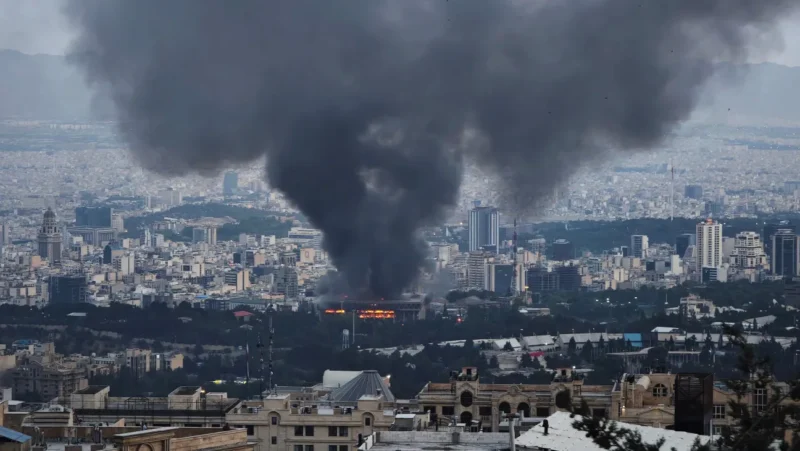
Tehran hit. Riyadh targeted. Missiles flying across borders. Is the Middle East entering a full-scale war?
The United States and Israel launched coordinated military strikes on Iran on Saturday, targeting what officials described as senior leadership and strategic security sites, triggering a rapid and dangerous escalation across the Middle East.
Explosions were reported in Tehran as the joint operation unfolded. President Donald Trump said the action was intended to eliminate a direct security threat to the United States and open space for political change inside Iran.
Tehran denounced the strikes as “unprovoked and illegal,” vowing consequences. Within hours, Iran launched retaliatory missile attacks against Israel and several Gulf countries hosting American military bases.
Saudi Arabia confirmed that missiles struck Riyadh and parts of its Eastern Province but said its air defenses repelled the attacks. The Saudi foreign ministry issued a sharp condemnation, describing the strikes as “blatant and cowardly Iranian attacks.”
“In light of this unjustified aggression, the Kingdom affirms that it will take all necessary measures to defend its security and protect its territory, citizens and residents,” the statement said, adding that retaliation remains an option.
The rapid exchange marks one of the most direct confrontations between Washington and Tehran in decades. The scope of the US-Israeli strike has not been fully detailed, but officials indicated that key security targets were hit.
Iran’s response broadened the battlefield, drawing Gulf states into the crisis. Several countries in the region host significant US military installations, raising fears of further strikes.
Regional governments are now on high alert. Air defense systems have been activated across multiple capitals, and commercial aviation routes are being reassessed as security conditions deteriorate.
Diplomatic channels appear strained. There has been no immediate indication of emergency talks, though international leaders are expected to push for de-escalation.
With missiles exchanged and capitals targeted, the conflict has shifted from brinkmanship to open confrontation. The coming hours may determine whether this remains a contained military exchange — or evolves into a broader regional war.
Top stories
Macron Signals Nuclear Shift as Europe Questions U.S. Shield

French President to Outline Deterrence Strategy at Submarine Base Amid Doubts Over American Nuclear Guarantees.
President Emmanuel Macron will travel Monday to France’s top-secret Île Longue submarine base to deliver a major speech on the country’s nuclear doctrine — a signal that Europe’s security landscape may be entering a new and uncertain phase.
The base, home to France’s four nuclear-armed submarines, provides a stark backdrop. Each vessel carries up to 16 M51 intercontinental ballistic missiles equipped with multiple warheads. As France’s commander in chief, Macron alone holds the authority to order their use.
The timing is significant. Russia’s war in Ukraine grinds on, Moscow has lowered its threshold for nuclear retaliation, and China and North Korea are expanding their arsenals. At the same time, questions have surfaced in parts of Europe about whether the United States would risk its own cities to defend European capitals under President Donald Trump.
For decades, U.S. nuclear weapons stationed in Europe formed the backbone of NATO’s deterrence strategy. But some European officials now speak more openly about contingency planning.
Rasmus Jarlov, chair of Denmark’s parliamentary defense committee, voiced the concern bluntly. “If things got really serious, I very much doubt that Trump would risk American cities to protect European cities,” he said, adding that Europe may need to look to France in the short term.
France is the European Union’s only nuclear-armed member. Macron previously stated in 2020 that France maintains fewer than 300 warheads — a stockpile he said was sufficient to inflict “absolutely unacceptable damage” on any state threatening France’s “vital interests,” which he noted have a “European dimension.”
Defense analysts will be listening carefully for signals of change: whether Macron expands the definition of France’s protective umbrella, increases cooperation with European partners, or hints at adjustments to arsenal size or deployment.
Germany has already opened discussions. Chancellor Friedrich Merz has acknowledged “initial talks” about nuclear deterrence, even publicly floating the idea that German aircraft could one day carry French nuclear weapons.
The language of deterrence is intentionally ambiguous, designed to keep adversaries guessing. But even subtle shifts in tone matter. With just 14 months left in his presidency, Macron’s remarks could shape Europe’s security doctrine for years to come.
As uncertainty clouds transatlantic guarantees, one question hangs over the Atlantic: if America’s shield weakens, will France’s nuclear force step into a broader European role?
Top stories
Hillary Clinton Clashes With GOP in Heated Epstein Testimony

From Epstein to UFOs — what really happened inside Hillary Clinton’s closed-door testimony?
Hillary Clinton spent hours behind closed doors before a House oversight committee investigating her alleged links to Jeffrey Epstein — and emerged accusing Republicans of staging a political distraction aimed at shielding former President Donald Trump.
The former secretary of state flatly denied knowing Epstein or visiting any of his properties. “I did not know Jeffrey Epstein,” she told reporters afterward. “I never went to his island. I never went to his homes. I never went to his offices.”
Clinton argued the Republican-led inquiry was less about uncovering facts and more about diverting attention. “What is being held back? Who is being protected? And why the cover-up?” she asked.
The session, held privately at the committee’s request, grew contentious at several points. Clinton said members repeated the same questions “over and over again,” before the discussion took what she described as an unusual turn. “I started being asked about UFOs,” she said, along with questions tied to the debunked “Pizzagate” conspiracy theory.
The hearing was briefly suspended after Representative Lauren Boebert leaked a photo from the closed session, which was later posted on social media by a conservative influencer. Clinton’s legal team objected, noting that photography is prohibited during private depositions. “We had agreed upon rules,” Clinton said. “One of the members violated that rule.”
Democrats on the committee countered that the investigation should focus on Trump and Commerce Secretary Howard Lutnick, who have both acknowledged past contact with Epstein. Representative Robert Garcia said Trump should testify under oath regarding his ties. Committee Chair James Comer dismissed the idea of subpoenaing the former president but left open the possibility regarding others.
Epstein, a convicted sex offender, died in jail in 2019 while awaiting trial on federal trafficking charges. Recently released Justice Department documents have renewed scrutiny of his network of prominent associates.
Clinton also defended her husband, former President Bill Clinton, who is scheduled to testify. She said she is “100% confident” he was unaware of Epstein’s crimes during their past social interactions and that his connection ended years before Epstein’s criminal conduct became public.
Transcripts and video from both testimonies are expected to be released, setting the stage for further political fallout in a case that continues to entangle high-profile figures across party lines.
-

 Somaliland1 month ago
Somaliland1 month agoF-35s Over Hargeisa: The Night Somaliland’s Sovereignty Went Supersonic
-

 Somalia1 month ago
Somalia1 month agoAid Destroyed, Trust Shattered: Somalia Loses U.S. Support for Good
-

 Terrorism1 month ago
Terrorism1 month agoForeign ISIS Pipeline Exposed: Puntland Captures Dozens of Non-Somali Fighters
-

 Somaliland1 month ago
Somaliland1 month agoSomaliland at Davos: The Moment Somaliland Entered the World’s Inner Circle
-

 Terrorism1 month ago
Terrorism1 month agoAmerica Pulls Back From Somalia but Doubles Down Next Door
-

 Top stories2 months ago
Top stories2 months agoSomali Pirates Hijack Chinese Fishing Vessel off Puntland Coast
-

 Middle East2 months ago
Middle East2 months agoUS War Plans Against Iran Enter Advanced Stage
-

 Opinion2 months ago
Opinion2 months agoTurkey’s Selective Morality: From the Ruins of Gaza to the Red Sea


